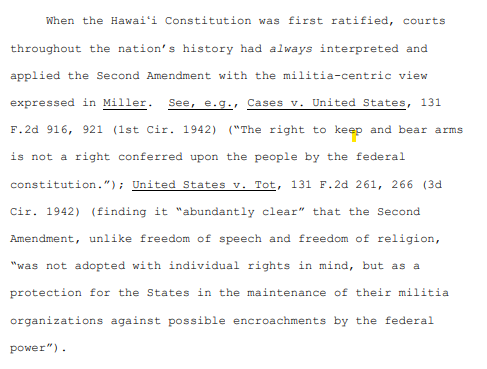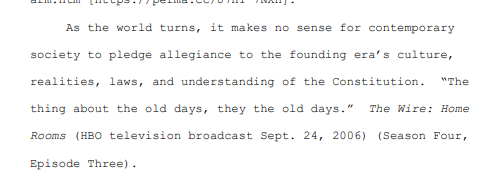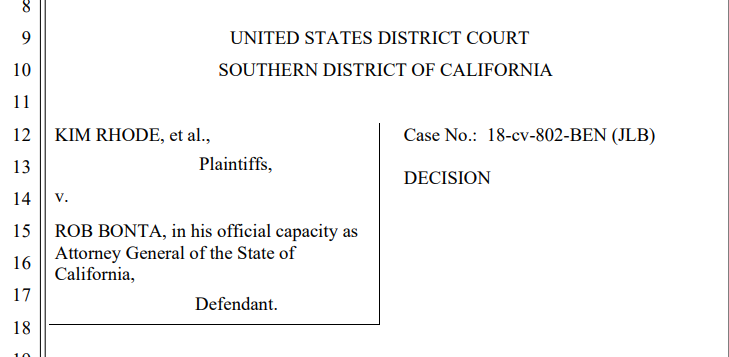The Hawaii Supreme Court released a ruling that sounds like Everytown wrote it for them. They say Heller was wrongly decided, and talk about the historical tradition of the former Kingdom of Hawaii as if that is at all relevant.
A lowlights thread.
A lowlights thread.

Note that this "crime" occurred pre-Bruen, when Hawaii had never issued any permit to anyone. So it's insane the State gets to argue he should have applied for a CCW permit.

Again, before Bruen, Hawaii had never issued a CCW permit to ANYONE. It's insane that the State Supreme Court says he should have done a futile act back in 2017 to have standing. 

They look at the Hawaii constitution first. But it's the same thing.
A well regulated militia being necessary to the security of a free state, the right of the people to keep and bear arms shall not be infringed. Art. I, § 17 (enacted 1959).
A well regulated militia being necessary to the security of a free state, the right of the people to keep and bear arms shall not be infringed. Art. I, § 17 (enacted 1959).

Hawaii's Supreme Court rehashes tired collective right arguments which the Supreme Court has expressly rejected, and overwhelming amounts of historical evidence confirm to be false (see my pinned thread, among other sources). 

Nonsense. If it meant just "people in a militia", it would have said that. Like everywhere else "the People" is mentioned, we are talking about individual rights or protections. 

Scalia debunked this in Heller. "Bearing arms" means military service, sure. But "to keep and bear arms" would make no sense if it was referring to just military service. Like Scalia said, it would be like interpreting "he stood up and kicked the bucket" to mean "he stood up and died."

This is hilarious because the Hawaii constitution was adopted in the 1950s. If the court is correct and it's just some militia right, why would that still be relevant by the mid-20th century, with our massive standing army? Why did Hawaii bother adding the provision? 

This is not true. The individual right was implicitly confirmed in Dredd Scott and Cruikshank. Terrible rulings for other reasons, but they both confirm in passing the thinking around 2A at the time. An individual right, albeit one that only limited the federal government until after 14th amendment incorporation.

Do you think they even realize that their legislative history excerpt destroys their own argument? If the Hawaii framers were intending a collective right, they wouldn't be talking about "reasonable restrictions on the right of the people". They'd say they can pass anything they want, as this is just about the right to a state militia.

Same thing here. This literally says "the right to acquire, keep or bear firearms..."!!!! Yes, maybe the 1950s Hawaii legislature had a muscular view of what gun control was allowed, including banning certain guns, but they still presuppose some individual right.
Is the Hawaii Supreme Court's reading comprehension nonexistent.
Is the Hawaii Supreme Court's reading comprehension nonexistent.

Oh sure, "clarified" 18 years later, in a way that is completely incompatible with what the legislature of 1950 said. Here, they say it's all about the militia, whereas in the excerpts from 1950 that the court cited, there was no discussion of the militia. Just an individual right, albeit one subject to regulations.
What actually happened here is Hawaii politicians adopted the then-ascendant "militia right" lie.
What actually happened here is Hawaii politicians adopted the then-ascendant "militia right" lie.

Woah WHAT?!
This is an outright lie. Even if you argue stuff like Dred Scott and Cruikshank are dicta because they only mention 2A in passing, there were several 19th century state court rulings confirming to various degrees the individual right.
This is an outright lie. Even if you argue stuff like Dred Scott and Cruikshank are dicta because they only mention 2A in passing, there were several 19th century state court rulings confirming to various degrees the individual right.

Jesus Christ, the arrogance here is off the charts. "This is what everyone thought."
No, it's what a cabal of hack academics and their well-to-do judicial allies gaslit the nation into believing for a few decades.
The Hawaii Supreme Court basically pretends all the 19th century rulings and commentary do not exist. Their example of "courts always ruled this way" was two rulings from the 1940s.
No, it's what a cabal of hack academics and their well-to-do judicial allies gaslit the nation into believing for a few decades.
The Hawaii Supreme Court basically pretends all the 19th century rulings and commentary do not exist. Their example of "courts always ruled this way" was two rulings from the 1940s.

Saul Cornell cite, because of course.
Also, cool how they cite Federalist No. 46, but omit the sentence which reads "Besides the advantage of being armed, which the Americans possess over the people of almost every other nation...."
Do they think Madison meant that the "advantage" spoken of there was the right to serve in a government militia? Because people in other nations definitely had that "right" too.
Also, cool how they cite Federalist No. 46, but omit the sentence which reads "Besides the advantage of being armed, which the Americans possess over the people of almost every other nation...."
Do they think Madison meant that the "advantage" spoken of there was the right to serve in a government militia? Because people in other nations definitely had that "right" too.

OK so again, if this is all true, and the 2A is just about militias, what goal was the 1950 legislature trying to accomplish by copying it into the Hawaii constitution? What was the point of doing that at a time when state militias didn't really exist anymore? 

It is hilarious that they keep saying what the 1950 Hawaii legislature meant through what the legislature 18 years later said.
Because the two times they actually cited the 1950 framers, they were clearly talking about an individual right.
Because the two times they actually cited the 1950 framers, they were clearly talking about an individual right.

WARREN BURGER QUOTE!
The hackery is unprecedented. This is written by antigun twitter, basically.
As my pinned thread demonstrates, Warren Burger was a liar, ignorant, or both.
The hackery is unprecedented. This is written by antigun twitter, basically.
As my pinned thread demonstrates, Warren Burger was a liar, ignorant, or both.

Who cares what "a majority of historians" think? Most of these are activists masquerading as unbiased historians. For example, almost none of them ever seriously discuss the overwhelming amount of nineteenth century commentary, because it obliterates their arguments. They pretend it doesn't exist.

This is another bullshit post-Bruen criticism. Nobody is saying judges have to be historians. They merely have to take historical laws the state presents and see if they are sufficiently similar to modern laws. Analyzing laws is a judge's whole job. 

Notice how they say 1791 and 1868, but then only talk about guns from 1791. Because if they talked about guns from 1868, their argument would fall apart. By 1868, revolvers had proliferated. Much of the gun crime we see today was possible with the weapons of 1868. So even if you think 1791 shouldn't count because guns were so much more primitive, a lot of that gap was erased by 1868.

Here they cite the Bevis court's error (at least I hope it wasn't intentional) that a semiatuo AR15 has a fire rate of 300 rounds per minute. Which is five rounds every second. 

Sounds like the Hawaii Supreme Court doesn't even want to be a part of the United States, in this rejection of not just the Second Amendment but their culture and understanding of the Constitution. 

They are about to get into the history of Hawaii. Before going into that, I wanted to share an old post I did about when Hawaii became part of the US. Basically, they had to abandon laws that were inconsistent with the US constitution, but could keep the rest. Some of the laws that had to be abandoned? See below.
https://twitter.com/MorosKostas/status/1631495779604140032
So to be clear, in its analysis of the Hawaii right to bear arms provision, which is identical to the federal one and was adopted by the Hawaii legislature in 1950, the Hawaii Supreme Court looks to the history of Hawaii when it was a foreign nation.
Cool.
Cool.

Ah yes, "The Law of the Splintered Paddle".
What the hell is this court talking about right now? They complained judges are now historians, but they are now giving an irrelevant history lesson from a time when Hawaii wasn't part of the US?
What the hell is this court talking about right now? They complained judges are now historians, but they are now giving an irrelevant history lesson from a time when Hawaii wasn't part of the US?

The Hawaii Supreme Court cites to the Young case, which omitted that Hawaii had to get rid of certain gun control laws to become a state. That they partially reimplemented them later is irrelevant - the draconian form of these laws was seen at the end of the 19th century as incompatible with our constitution.

Once again, at the time this man was charged, no one had ever gotten a CCW permit in Hawaii.
It's completely abdication of the judicial role to ignore this, unless the petitioner never brought it up, which I find unlikely.
It's completely abdication of the judicial role to ignore this, unless the petitioner never brought it up, which I find unlikely.

I hope the poor guy dealing with all this nonsense files a cert petition. What a preposterous ruling by a bench of antigun activists.
You can read the whole dumpster fire here.
drive.google.com/file/d/17KDCuf…
You can read the whole dumpster fire here.
drive.google.com/file/d/17KDCuf…
• • •
Missing some Tweet in this thread? You can try to
force a refresh

















